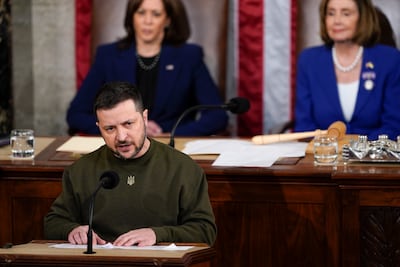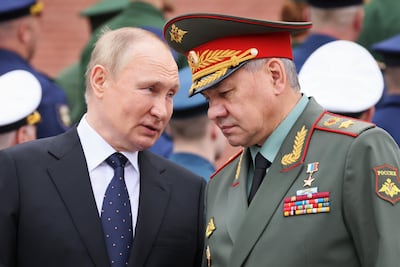February 24 will mark the first anniversary of the Russian invasion of Ukraine, a major escalation of the Russo-Ukrainian War that began with Moscow's occupation and annexation of Crimea in 2014.
Last month, Ukrainian President Volodymyr Zelenskyy visited Washington to lobby for continued and increased support of his country’s efforts to resist the invasion and occupation. In response, different voices in the American capital's policy arena, against the grain of overwhelming support for Mr Zelenskyy, warned against "never-ending" or "endless" war. They insisted that the US’s interests lay not in supporting Mr Zelenskyy’s objective of resisting Russian forces, but in pushing Kyiv to pursue political opportunities to end the conflict. Otherwise, they pointed out, further escalation is likely, which will be catastrophic for American interests. It’s an interesting argument but ultimately a contradictory one that does not hold up.
From the outset, it should be established clearly what a "never-ending", "endless" or "perpetual" war actually means. The concept has been used invariably to describe American involvement in Vietnam and Latin America, where the US was intervening in order to create a counter-balance to communism in different regions. The "perpetual" aspect of those interventions was described as a natural consequence; interventions created more instability, which thus provided the pretext for further responses, which meant more conflict. There were no conditions for ending those conflicts, and the end was never in sight, because external involvement necessarily meant that the conditions for a continual loop of intervention would persist. As such, resources are poured into conflict and war for ideological and political purposes, such as "war on communism", or such like.

But this is all different from what is happening in Ukraine.
There is no endless ideological goal being pursued here by the US and other western countries by supporting Ukraine. It’s quite straightforward; an independent country, Ukraine, has seen its sovereignty challenged, decades after it became independent from the then Soviet Union. Its territory has been militarily occupied, which is illegal under international law. Helping Ukraine resist further occupation, and resist the invasion, is not some kind of narrow western ideological objective.
On the contrary, it is the reverse. If there is an ideological objective at play, one need only listen to the stated and argued reasons for the invasion by Russian President Vladimir Putin. He is quite clear and transparent in this regard; he views Russia as having declined since the dissolution of the Soviet Union, and this war is framed as a way to regain Russia’s status as a "great power". While Mr Putin did make Nato's refusal to ban Ukraine from ever entering the alliance grounds for an invasion, there is no national security reason that he articulated that would objectively justify this so-called "special military operation". Neither Ukraine, nor any of Russia’s neighbours, have ever expressed a desire to invade Russia. Even if there had been such a desire, Moscow’s move would have relied on the dubious notion of "pre-emptive self-defence" – but there was no such desire in any case. Indeed, if one wanted to use the frame of "never-ending" or "perpetual" war, it would be more appropriate to apply the logic to Russia and its moves. There is reason to suggest that if Moscow emerged successful in the war, it would try to move on to other countries in the neighbourhood, again, on the notion of pre-emptive self-defence.

As for support of Ukraine, that can hardly be described in the frame of "perpetual" war; but to insist on doing so is to inadvertently buy into Russia’s narrative on the war. To describe it as "never-ending" is to question the legitimacy of continuing support for Ukraine; and to withdraw support is to tacitly admit that Moscow had an understandable reason for invading Ukraine in the first place, even if not entirely legitimate.
It is important to be abundantly clear about the incongruity and illogic underlying this line of discussion being adopted by some policy wonks in Washington. By not being so, we are not simply abandoning Ukraine; we are abandoning any concept of international order that is not based on the notion that "might is right".
Many will rightly point that international order has been challenged in previous years; plenty of examples abound, including the US invasion of Iraq in 2003 and the Syrian civil war since 2011. But international order will not be improved by overlooking the largest land war in Europe since the Second World War. And the world knows it. There is no state on this planet that claims Russia was justified in its actions; rather, the world is divided into those states that stand by Ukraine and those that are neutral for various reasons. But no state, other than Russia, is actually saying that the invasion was a good idea.
We do run the risk of a never-ending war at this moment in history, because if international order is so crippled that it admits that might is indeed right on account of a Russian victory in Ukraine, then many more such episodes risk becoming an inevitable consequence. But there is a way to avoid that eventuality. And that means standing by Ukraine until there is recognition that the costs of invading a sovereign nation far outweigh any perceived benefits.


